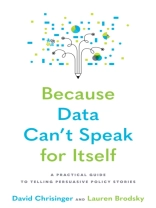A guide for how to tell clear, data-driven stories that will make an impact.
People with important evidence-based ideas often struggle to translate data into stories their readers can relate to and understand. And if leaders can“t communicate well to their audience, they will not be able to make important changes in the world.
Why do some evidence-based ideas thrive while others die? And how do we improve the chances of worthy ideas? In Because Data Can“t Speak for Itself, accomplished educators and writers David Chrisinger and Lauren Brodsky tackle these questions head-on. They reveal the parts and functions of effective data-driven stories and explain myriad ways to turn your data dump into a narrative that can inform, persuade, and inspire action.
Chrisinger and Brodsky show that convincing data-driven stories draw their power from the same three traits, which they call people, purpose, and persistence. Writers need to find the real people behind the numbers and share their stories. At the same time, they need to remember their own purpose and be honest about what data says—and, just as importantly, what it does not.
Compelling and concise, this fast-paced tour of success stories—and several failures—includes examples on topics such as COVID-19, public diplomacy, and criminal justice. Chrisinger and Brodsky“s easy-to-apply tool kit will turn anyone into an effective and persuasive evidence-based writer. Aimed at policy analysts, politicians, journalists, teachers, and business leaders, Because Data Can“t Speak for Itself will transform the way you communicate ideas.












